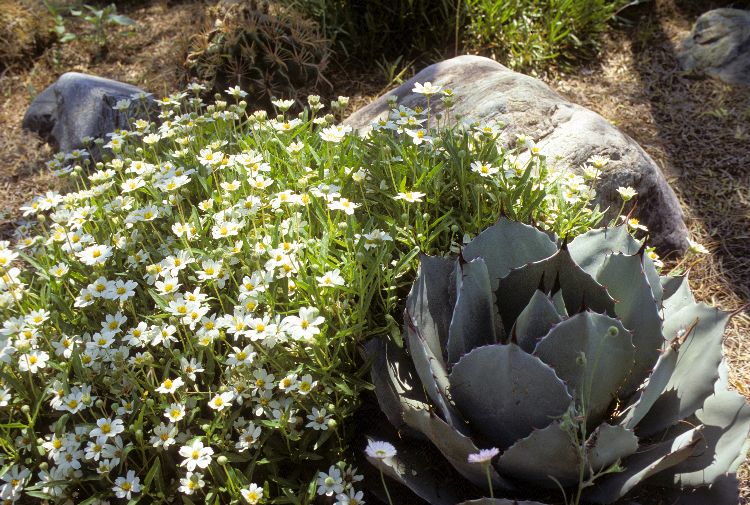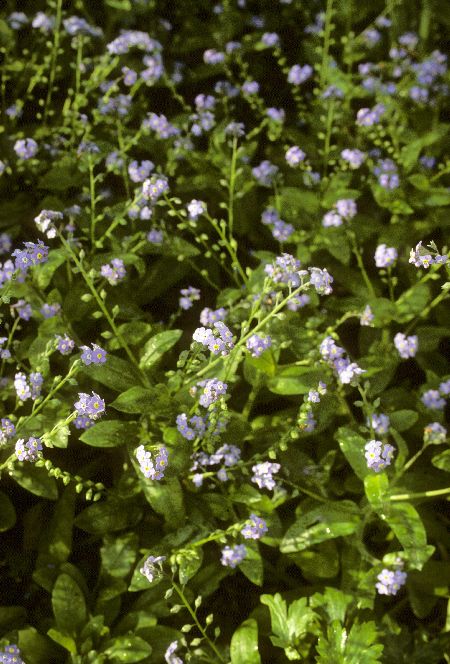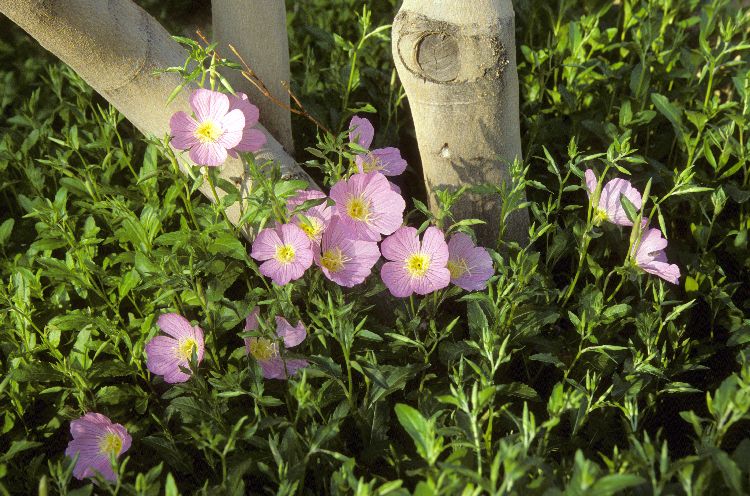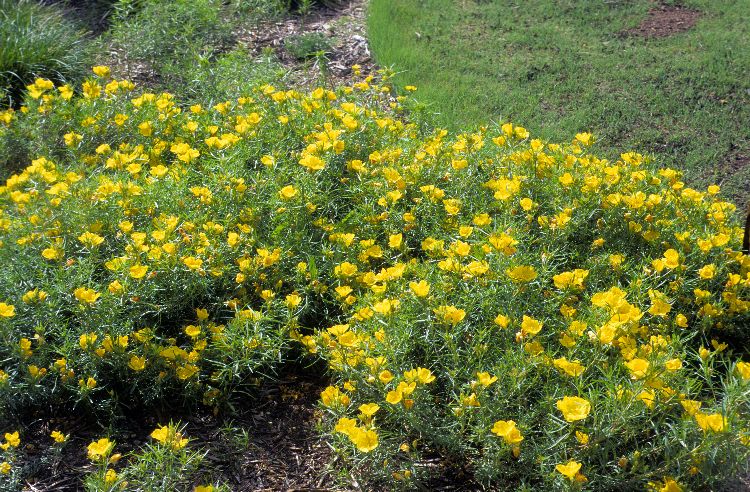Leonotis leonurus
Lion's Tail
Lion's Tail is a widely adapted shrubby perennial. Care depends on region where it is grown. If damaged by winter cold, plants are treated as large perennials and usually regrow from the crown. Prune plants back after flowering to renew flowering wood. Accepts dry summer conditions. Canopy coverage: 20 square feet.
[Read More]Liatris spicata
Spike Gayfeather
Gayfeather is a forgiving plant that is easy to grow. Leaves are grasslike and form as a clump at the base of the plant. Spikelike flowers rise vertically above leaves in summer. Plant in well drained soil. 'Kobold' is an improved selection. Canopy coverage: 3 square feet.
[Read More]Lilium cultivars
Lily
Easter lilies are a well-known holiday tradition, but Lily species and cultivars number in the hundreds and are available in a wide range of sizes and flower colors. Plant from bulbs in spring or fall in well prepared soil. Canopy coverage: 3 to 28 square feet.
[Read More]Limonium perezii
Sea Lavender, Statice
Sea Lavender is a tough plant with a long, profuse period of bloom. Leaves are large, up to 1 foot wide. Locate plants where they will receive afternoon shade in hot summer regions. Use caution when planting along the coast; it tends to naturalize there. Canopy coverage: 7 square feet.
[Read More]Linum lewisii
Blue Flax
Blue Flax is a short-lived perennial wildflower. Sow seeds directly where you want plants to grow in the fall. Reseeds readily to extend plantings. Additional water extends bloom period. Canopy coverage: 3 square feet.
[Read More]Lobelia erinus
Lobelia
Lobelia is a cold-tender perennial grown as an annual. It is low-growing and offers flowers in pleasing shades of blue. Nice when used in containers to drape over the edges. Can sometimes reseed to extend plantings.
[Read More]Lobelia laxiflora
Mexican Bush Lobelia
Mexican Bush Lobelia puts on a show of color, and accepts a wide range of climates, from coastal to desert. Reduce exposure to the sun and limit summer water by planting where it will receive afternoon shade in hot summer areas. Best in well draining soils. Spreads wide via underground rhizomes, so be prepared to control its invasive tendencies. Canopy coverage: 13 square feet.
[Read More]Lonicera x americana
Americana Honeysuckle
This hybrid vine or perennial is cold hardy and adapted to a wide range of exposures. Plants grow tall, scrambling over structures. Flowers are fragrant and come in bright colors. For desert regions, consider 'Pam's Pink'. It is smaller to 6 feet high, accepts full sun and is even more hardy to cold: -20F. Canopy coverage: 491 square feet.
[Read More]Lychnis coronaria
Rose Campion
Rose Campion features small, brilliantly colored flowers set off against silvery gray leaves. Reseeds easily to extend plantings. Canopy coverage: 3 square feet.
[Read More]
Melampodium leucanthum
Blackfoot Daisy
The growth habit of Blackfoot Daisy is a low mound. Daisylike flowers with yellow centers bloom almost year-round. Attractive planted among boulders or in rock gardens. Canopy coverage: 3 square feet.
[Read More]Mimulus aurantiacus
Bush Monkey Flower, Sticky Monkeyflower
This sprawling perennial or subshrub grows upright to about 3 feet high and as wide. The tubular flowers are brightly colored and are 1-1/2 to 2 inches long. Leaves can be sticky, thus the common name. Prefers well-drained soil. Canopy coverage: 7 square feet.
[Read More]Monarda didyma
Scarlet Bee-Balm
Bee-Balm features tall stems lined with tufts of brightly colored, 2- to 4-inch flowers. Look for selections that are resistant to powdery mildew. Canopy coverage: 3 square feet.
[Read More]
Myosotis sylvatica
Forget Me Not
Forget Me Not is a shortlived perennial often grown as an annual. It produces profuse numbers of small blue flowers in spring. Easy to start from seed; plant seeds where you want plants to grow in the fall.
[Read More]Nepeta racemosa
Catmint
This species is notorious for reseeding vigorously, so be aware plants may turn up where you don't want them. Improved selections are available; 'Walker's Low' makes a good groundcover. Also see Nepeta x faassenii, which produces sterile seeds. Canopy coverage: 3 square feet.
[Read More]Nepeta x faassenii
Faassen's Catmint
This Catmint hybrid is sterile, so does not set viable seed. It is an improved selection compared to Nepeta racemosa. Best with some protection from the sun in hot summer regions. Canopy coverage: 3 square feet.
[Read More]
Oenothera berlandieri
Mexican Evening Primrose
The large, bright to dark pink flowers of Mexican Evening Primrose are profuse in spring. It evokes a lush, subtropical appearance. It is known to be invasive, so plant in containers or easily contained area. Freezes to the ground with cold temperatures but regrows the following spring. 'Siskiyou' is an improved selection. Canopy coverage: 13 square feet.
[Read More]Oenothera caespitosa
Tufted Evening Primrose
This Primrose blooms in the late afternoon and evening hours, so locate it near outdoor living areas or entries where it can be enjoyed. Flowers are fragrant, and can reach up to 4 inches across. Canopy coverage: 7 square feet.
[Read More]Oenothera macrocarpa
Missouri Evening Primrose
Missouri Evening Primrose produces large, 4-inch flowers that are pure yellow. Flowers last only one day, but because flowering is so profuse it is hard to notice. Accepting of tough conditions. Better with afternoon shade in hottest climates. Canopy coverage: 3 square feet.
[Read More]
Oenothera stubbei
Saltillo Primrose
This is a colorful, fast-growing groundcover with a clumping growth habit. The fragrant yellow flowers open in late afternoon until the following morning. Canopy coverage: 7 square feet.
[Read More]Origanum 'Santa Cruz'
Santa Cruz Oregano
The summer color of this spreading perennial is comprised of pink bracts, which are modified leaves. They surround the tiny lavender flowers of this ornamental Oregano. Provide with well-drained soil. Canopy coverage: 7 square feet.
[Read More]Origanum vulgare
Common Oregano
Common Oregano, also known as Wild Marjoram, is variable regarding leaf scent and culinary flavor. Color comes from flowers as well as bracts, which are modified leaves that surround flowers. Spreads and reseeds on its own. May die down with winter cold but comes back from the roots. Useful in cooking. Canopy coverage: 7 square feet.
[Read More]